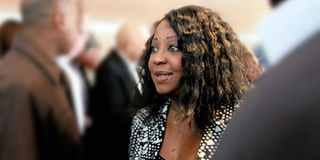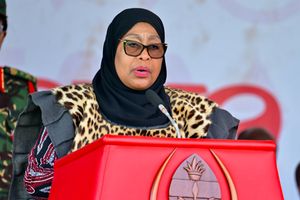Samoura: The First African woman at the helm of Fifa

Fatma Samba Diouf Samoura
What you need to know:
Ms Fatma Samba Diouf Samoura awhen Fifa is not only battling graft, but gender issues as well
Nairobi. Many across the world have hailed the appointment of Ms Fatma Samba Diouf Samoura as Fifa’s first female and first African Secretary General as a progressive step and the media has been awash with congratulatory messages. This historic appointment would perhaps change the future of soccer by making it scandal free and drive the game forward as had been suggested by fans.
In February this year, Transparency International while releasing its Global Corruption Report: Sport indicated that soccer fans had lost trust with Fifa due to graft. Sixty-four per cent of respondents in that survey suggested that they wanted more women in key positions at world soccer governing body.
“Fifa should take this message to heart. Unless it acts, more fans will turn away from football. The trust levels are low, but the fans will give Fifa a chance if it acts now,” Sweeney, one of the respondents, was quoted by the transparency International as saying.
“As fans, we have a love affair with football. When our teams win, we are ecstatic, when they lose we are devastated. But when results -- whether of games, or rights for hosting events, and elections, among others -- are driven not by fair competition, but by corruption, we feel betrayed,” Cobus de Swardt, managing director of Transparency International was also quoted as saying in the report.
And it seems Fifa took all these messages to heart, given last week’s appointment of Ms Samoura. Her appointment comes at a time when Fifa is not only battling graft, but gender issues as well. Fifa has been routinely accused of sexism in appointing its officials. So the nomination of Samoura, is an attempt by the organisation to address gender balance in soccer.
Ms Samoura, a 54-year-old Senegalese, is currently the UN’s Resident/Humanitarian Coordinator and UNDP Resident Representative in Nigeria. Her multilingual ability to speak French, English, Spanish and Italian makes her more suitable for her new role.
“I also look forward to bringing my experience in governance and compliance to bear on the important reform work that is already underway at Fifa...,”
Ms Fatma Samba Diouf Samoura, Fifa Secretary General
She boasts 21-year experience at the UN World Food Programme, a career that took her to several African countries as a director or representative. Samoura also has private sector experience, having worked for Senchim, a subsidiary of Industries Chimiques du Senegal, according to Destiny Magazine.
She holds a Masters Degree in English and Spanish from the University of Lyon; and a Post-Masters Degree in International Relations/International Trade from the Institut d’Etudes Supérieures Spécialisées (IECS)- Strasbourg-France.
Though still subject to passing eligibility check, her international experience as an administrator, who understands transparency while improving her team’s performance, could go along way in improving Fifa’s corrupt image.
Ms Samoura’s integrity and operational experience seemed to have impressed President Infanito so much that she gave her a glowing tribute during the 66th FIFA Congress in Mexico City.
“It is essential for Fifa to incorporate fresh perspectives -- from outside the traditional pool of football executives -- as we continue to restore and rebuild our organisation,” President Infantino said. “No one exemplifies what we need more than Fatma does, and we are thrilled that she has joined our team.”
Gender equality in soccer has been a burning issue, especially in the US where the national women’s team has filed a federal complaint against the US Soccer Federation to complain about pay gap. In 2014, 84 woman soccer players from 13 countries filed a gender discrimination complaint with the Ontario Human Rights Tribunal against Fifa and the Canadian Soccer Association (CSA) after it was announced that the 2015 World Cup would be played on artificial turf instead of natural grass. These are some few examples although there are several others of this nature.
The good news is that the world soccer governing body would now embrace diversity and gender equality as President Infantino had affirmed.
Commenting on her appointment, Samoura confirmed that the new role would perfectly fit her skills and experience in high-impact team building in international settings, which would help grow the game of football all over the world.
“I also look forward to bringing my experience in governance and compliance to bear on the important reform work that is already underway at Fifa. The organisation is taking a fresh approach to its work and I am eager to play a role in making that approach as effective and lasting as possible.”
Many hope that Ms Samoura, who replaces Jerome Valcke, who was fired last September for the illegal sale of World Cup tickets, would use her deep knowledge of world football, operational experience in a multi-cultural setting and proficiency in governance to bring roof stinking corruption at Fifa to its knees thus tackle its credibility deficit.
According to Quartz Africa, an online magazine, she is taking a crucial role, which would go a long way in building an important relationship with the continent that makes up Fifa’s largest voting bloc.
During Sepp Blatter’s reign at Fifa, many projects focused on growing the game in Africa and he played key role in the 2010 Fifa World Cup bid won by South Africa. This made him enjoy goodwill in Africa although he left very sexist policies in the organisation that irked many. Woman activists like Penny M. Venetis, the executive vice president and legal director of Legal Momentum, the Women’s Legal Defense and Education Fund, hopes bigotry went with Blatter when he left. In her opinion in The Guardian, the UK’s newspaper, Prof Venetis blames Blatter for his blatant sexism and discrimination of women in soccer. She points out that Fifa should put a woman in charge of the organisation and in senior management positions; change its bylaws to ensure that both men and women’s matches are played on grass; insist that national soccer federations equalise pay scales for male and female players; and address the exploitation of women in World Cup host countries.
Women are now optimistic that with Ms Samoura’s humanitarian background, her ascension to the Fifa helm would usher in a new era in soccer as she would effectively address Fifa’s discriminatory policies against women players and perhaps level the playing field for all genders. And for Fifa, it is a major stride in women empowerment.




